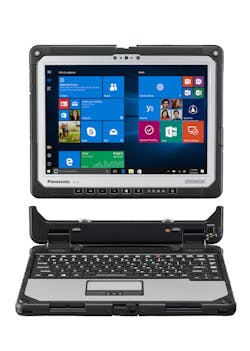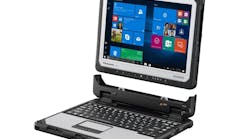NEW YORK CITY – Panasonic has introduced its new 12-inch, fully-rugged two-in-one laptop called the Toughbook 33.
The announcement was made on the 102nd-floor Observation Deck of the Freedom Tower in New York City last night – a fitting place for the unveiling of an ultra-modern device that is used by people in the fire, EMS and law enforcement professions as well as the workers who erected the marvel, literally from the ashes of the devastating attacks that occurred on Sept. 11, 2001.
The new device works as a regular laptop with a traditional docking station for vehicle mounting, or it can be detached from the keyboard with a revolutionary single snap release for mobility in the field, converting it into a powerful tablet with a touch screen and just as much rugged reinforcement as previous models, the company says.
It was 20 years ago when Panasonic first introduced the Toughbook and the new iteration builds, exponentially on the success of its predecessors.
During his comments made at the unveiling last night, Magnus McDermid, Panasonic's senior vice president of Mobility Solutions, said his company has 250 million units deployed in the rugged laptop market.
He said the company takes its responsibility as the leader in the market very seriously.
“The new device takes the rugged laptop to the next level, McDermid said.
McDermid said Panasonic works with the firefighters and law enforcement officers of New York City every day and have learned what their needs are and created the product to fit the need.
“Every job is a tech job and we’ve design great devices for that purpose,” McDermid said.
Brian Rowley, vice president of Marketing and Product Management, Panasonic System Communications Company of North America, also spoke at the event last night.
Rowley said Panasonic works closely with its partners to develop products that are purpose built for each particular business sector. Unlike other companies, Panasonic doesn’t build one-size-fits-all devices and force its customers into adapting to using it in their particular fields.
“That’s side-by-side engagement,” Rowley said. He added that product development is two-way process where Panasonic learns from the customers and that way the customers get what they need.
For example, Rowley said Panasonic worked extensively with Houston Fire Department to help manage the approximately 800,000 911 calls it gets every year.
Rowley said Panasonic worked closely with Houston providers to come up with the ETHAN (Emergency TeleHealth and Navigation) Project. It is designed to help providers reduce the number of costly ambulance trips by allowing patients to speak directly to doctors through Panasonic Toughpads by video conferencing.
Using Panasonic’s integrated 4G LTE connectivity, providers, doctors and patients can determine whether a trip to the emergency department is truly needed.
Rowley said the ETHAN Project has been successful because of the cooperation between the client and the company which benefits everybody.
“It makes sure we produce the best possible products available,” Rowley said.
In prepared statements issued after the product launch, Rowley said: “From the beginning, we’ve designed the Toughbook product line with the demands of the mobile workforce in mind and the 2-in-1 Toughbook 33 device is the truest expression of that commitment to date.”
Rowley added: “From its remarkable 3:2 display, to its durable-but-flexible detachable design, the Toughbook 33 laptop is purpose-built to reset expectations for rugged mobility.
Dan Diliberti, Panasonic’s senior product development manager, who was the head of the Toughbook 33 project, said the development of the new product was two years in the making.
During development, Diliberti said one of the major concerns Panasonic heard from the customers was the new laptop needed “backwards compatibility.” In other words, the new device had to work with legacy programs and existing hardware, especially docking stations in vehicles.
Customers, Diliberti said, were ready for the technological upgrade, but they didn’t want update programs and they certainly did not want to lose the investments they had made in the vehicle mounts. He said they can cost between $500 and $1,000 each and when departments’ and agencies have literally thousands of vehicle in a fleet, the mounts can be a significant investment. So, Panasonic achieved both, with the docking station needing an adaptor to make it function.
“With all of that innovation, the journey has lead us to this, the Toughbook 33,” Diliberti said as the new device was shown to the public for the first time.
Diliberti said the new laptops will start shipping in 30 days.
The Toughbook 33 is expected to start around $3,649.








